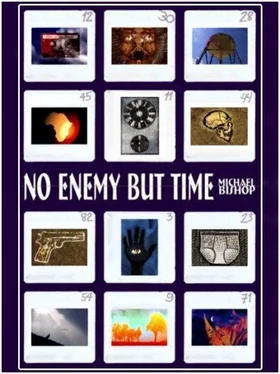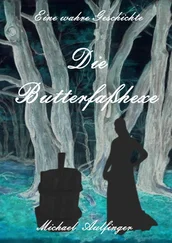Following dinner the Minids wrestled, raced, and cut capers, the curmudgeons along with the kiddies.
There was not much order to these postprandial festivities, only enthusiasm and a high level of tolerance for juvenile mischief, no matter how old the perpetrators. I had recovered from both my dizziness and my irrational fears of coming down sick. And although the bloated feeling that springs from overindulgence now plagued me, I bore it stoically. I did not care if I ever returned to the present. The moon, looking little or no different from the way it looks today, spilled its ghostly lantern sheen across the vast savannah.
The Minids and I were Children of Eve together, Sons and Daughters of the Dawn. With Genly and Roosevelt as sentries, we lay down like siblings on the hilltop.
I was happy; supremely, unconditionally happy.
But I dreamt that night, a dream of my adolescence many thousands upon thousands of years into the future of the planet. No Alka Seltzer in the Pleistocene, you see, not even in the first-aid kit of an Air Force chrononaut…
Van Luna, Kansas
April 1964
Assoon as winter had given way to the uncertain balminess of a prairie spring, Jeannette began to take Anna and John-John on walks from their house on Franklin Street to Van Luna’s old-fashioned business district: two rows of faded brick buildings facing each other across a wide, cobblestone street. Van Luna was her hometown, the community in which she had first begun to formulate a philosophy about the way the world worked, and it was good to be back. Her burly father Bill had found them a small clapboard house to rent, and, having flown home from Spain in early November, the Monegals had moved into it only a week before President Kennedy’s assassination.
Lots of service families lived in Van Luna, in housing developments that had sprung up on the northern side of town. Air Force brats were as commonplace as roofing tar and ten-penny nails. Every morning their fathers drove the blacktop between their ticky-tacky suburban tract houses and McConnell Air Force Base on Wichita’s southeast side, and every evening, honorable executors of the SAC slogan
“Peace Is Our Profession,” they returned via the same stretch of highway. The Monegals, however, lived in an older neighborhood, relatively near the sleepy heart of the town. Although less financially secure than the families of the officers commuting from the tract houses, they were content with their lot. Serene in its welcome predictability, no more complicated than an iron doorstop, for the most part this was a happy period in their lives.
On their outings to the business district Anna would push her adopted brother in a squeaky stroller with a red-and-white-striped visor, while Jeannette brought up the rear pointing out flowers, meadowlarks, squirrels, even fire hydrants and lamp posts—anything at all to provide an excuse for her chatter, which she believed crucial to his development of verbal skills. (He was well past one now, and still not talking.) After descending through the park behind the Pix Theatre and the barbershop, they would cross the cobblestone street to Rivenbark’s Grocery. On an elevated concrete walk in front of the grocery, a pair of stubble-chinned retired farmers would be sitting on a railway bench swapping lies and lackadaisically ogling the street traffic. By Jeannette’s second or third such visit to her daddy’s store, they had assimilated John-John and determined that he was not a threat to civic order—not, at least, an immediate one.
Jeannette, after performing the usual obligatory greeting ceremonies with these old men, would lift the boy from his stroller and shoo Anna into the store ahead of her.
“Hey, Daddy,” Jeannette would call, going past the checkout counter, “I’ve come to get some stuff for supper.”
“Help yourself,” Bill Rivenbark would reply, wiping his hands on an apron stained with produce spills and marking ink. “Your money’s as good as anybody’s, baby.”
And she and the children would shop.
* * *
One afternoon Jeannette seated John-John backward in a shopping cart and pushed it up an aisle after Anna. Excited by so much bounty, the girl had skipped over the grimy softwood floor to the shelves of breakfast cereal and the small wire racks containing packets of Kool-Aid. (Yesterday morning Jeannette had found her in the kitchen over a bowl of Cocoa Puffs and a jelly jar brimming with a sweetened, artificially flavored drink the color of thin antifreeze.)
“Anna!” Jeannette said. “Anna, we have plenty of those things!”
At the end of the aisle appeared another shopping cart, its operator a fiftyish woman who had hidden her hair in a bright blue scarf and fairly effectively concealed her ample figure in a turquoise chemise. This woman smiled at Anna—a long-legged child with perfect skin and Natalie Wood eyes—and turned to remove a canned item from the shelf across from the cereals. When she saw John-John, however, she stayed her hand and studied the boy quizzically. Then she backed her cart out of the aisle and headed for a frozen-food locker out of Jeannette’s field of vision. Jeannette could hear one of the locker’s glass windows sliding in its aluminum grooves.
Strange, she thought, suddenly uneasy. Very strange.
It grew stranger. Right there in Rivenbark’s Grocery the woman in the blue scarf initiated a game of Cops and Robbers. She made a point of following Jeannette and the children up and down the high-ceilinged old store’s several aisles, pausing when they paused, trundling when they trundled. This game continued right up to the moment that Jeannette wheeled her cart into her daddy’s checkout lane.
Bill was not behind the register, however, and the woman came cruising up behind Jeannette as if, by some unlikely coincidence, they had concluded their shopping at the same time.
“You’re Bill’s daughter, aren’t you? Bill and Peggy’s little girl, Jeannette?”
“Yes, ma’am.”
“I’m Mrs. Givens.”
“Pleased to meet you,” Jeannette said, extending her hand.
Mrs. Givens ignored the proffered hand. “You met me when you were younger, four or five times. I know you.”
“Oh. Well, I—”
“What kind of husband did you marry?”
“Ma’am?”
Quite gracefully for one so big-boned and meaty, Mrs. Givens squeezed past her shopping cart and slipped her hand into John-John’s hair. Her fingers twisted the nap; not viciously, but not sympathetically, either. “What kind of hair do you call this?” she asked, leveling an inquisitorial stare at Jeannette.
“Hey,” said Anna, “get your hands off my brother.”
Jeannette was too taken aback to speak.
“What kind of hair do you call this?” Mrs. Givens insisted, closing her hand on a tuft above the child’s left temple. John-John’s eyes were as big as horehound jawbreakers. He yanked his head aside without dislodging the woman’s grip.
This movement prompted Jeannette to strike. She slapped the other woman’s wrist so stingingly that John-John was freed. “I call it head hair!” she raged. “I call it head hair because it grows on his head. If it grew on his elbow, I’d call it elbow hair. Listen, what’s the matter with you? You’ve gotta be—” She stopped, her heart doing somersaults and her hand trembling.
Bill Rivenbark slipped in behind the checkout counter, flustered. Mrs. Givens, ignoring his arrival, unknotted her blue scarf and swept it from her head in a single dramatic motion.
“It’s not hair like this,” she told them quietly. “Or like yours, Jeannette. Or like your little girl’s.” She looked at the grocery’s proprietor. “It’s not hair like yours, either, Bill.”
Читать дальше



![Ally Carter - [Gallagher Girls 01] I'd Tell You I Love You But Then I'd Have to Kill You](/books/262179/ally-carter-gallagher-girls-01-i-d-tell-you-i-lo-thumb.webp)








